Samsung Series 7 NP700Z7C Review
by Jarred Walton on August 16, 2012 2:05 AM ESTSamsung Series 7 General Performance
We start as usual with our general performance application benchmarks. We’re reaching the point where we now have quite a few notebooks in our updated Mobile Benchmark suite, and we’ve tried to select some reasonable comparison points. Here’s the list of laptops we’ll be using for our charts, along with a brief overview of their specs; note that the Dell XPS 15 results are still “preliminary”—we’re still hoping for a BIOS update that will improve the overall experience without requiring the use of utilities like ThrottleStop. Also, the ASUS N56VM/N56VZ we previewed used different hardware than what currently ships, specifically it has a Fermi-based GT 630M instead of a Kepler-based GT 650M. The full specs for each laptop can be found in their respective reviews, which we’ve linked in the table below.
| Laptop Configuration Overview | ||||
| Laptop | CPU | Graphics | Storage | Battery |
| Acer Aspire V3-571G | Intel i7-3610QM | GT640M/HD4000 | HDD | 48Wh |
| Acer Aspire S5 | Intel i7-3517U | HD4000 | SSD | 35Wh |
| Acer TimelineU M3 | Intel i7-2637M | GT640M/HD3000 | SSD | 55Wh |
| AMD Trinity Prototype | AMD A10-4600M | HD7660G | SSD | 56Wh |
| ASUS N56VM (Prerelease) | Intel i7-3720QM | GT630M/HD4000 | HDD/SSD | 56Wh |
| ASUS G74SX-A2 | Intel i7-2630QM | GTX560M/HD3000 | SSD | 90Wh |
| Clevo W110ER | Intel i7-3720QM | GT650M/HD4000 | Hybrid (Seagate) | 62Wh |
| Dell XPS 15 (Preliminary) | Intel i7-3612QM | GT640M/HD4000 | Hybrid (SRT) | 65Wh |
| Razer Blade | Intel i7-2640M | GT555M/HD3000 | SSD | 60Wh |
| Samsung Series 7 17.3” | Intel i7-3615QM | GT650M/HD4000 | Hybrid (ExpressCache) | 77Wh |
| Sony VAIO SE | Intel i7-2640M | HD6630M/HD3000 | HDD | 49Wh |
| Toshiba P755D | AMD A8-3520M | HD6620G | HDD | 47Wh |
We have quite a few SSD-equipped laptops in our list, which will mostly influence the PCMark results. As mentioned already, the Samsung Series 7 uses Condusiv Technologies’ (formerly Diskeeper Corporation) ExpressCache software to provide SSD caching, but the end result ends up feeling more like a hard drive than an SSD—though whether that’s the small 8GB SSD or the software itself is difficult to say. The Dell XPS 15 we reviewed last month uses Intel’s SRT and definitely felt more like an SSD, and even Seagate’s Momentus XT (also with 8GB of cache) can help compared to a straight HDD. The $5 saved by going with the HM76 instead of HM77 doesn’t look so good when we see the impact it has on general performance.
Note that once again, we’ve run PCMark 7 using Intel’s IGP as well as the NVIDIA dGPU; the presence/lack of Intel’s Quick Sync technology can have a sizeable impact on the overall PCMark score, and in particular the Entertainment, Creativity, and Computation scores are affected. For the other laptops, we’ve used the best score for each chart (e.g. IGP for the Computation results). The Series 7 results are in green, with the similarly equipped Dell XPS 15 results in yellow. We also have results for the ASUS N56VM/N56VZ prototype with both HDD and SSD (light blue) storage, so you can get a feel for the range of performance that the storage solution creates.
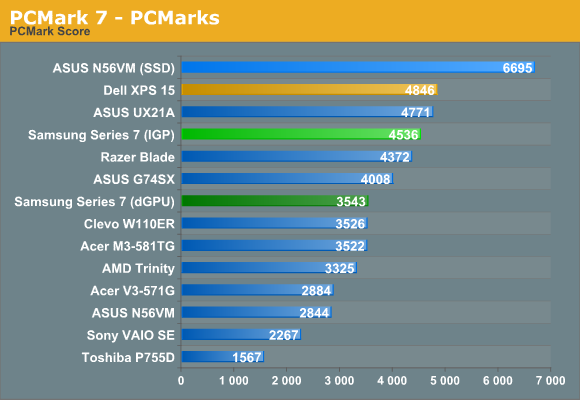
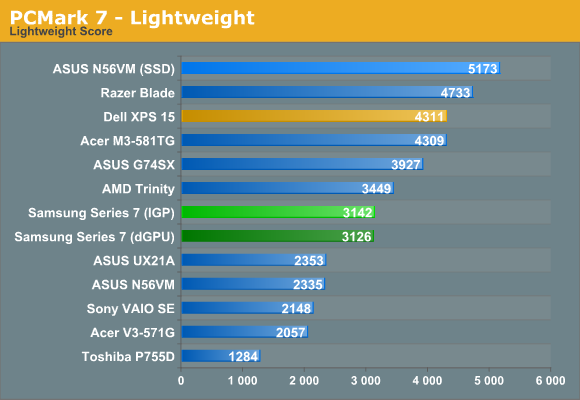
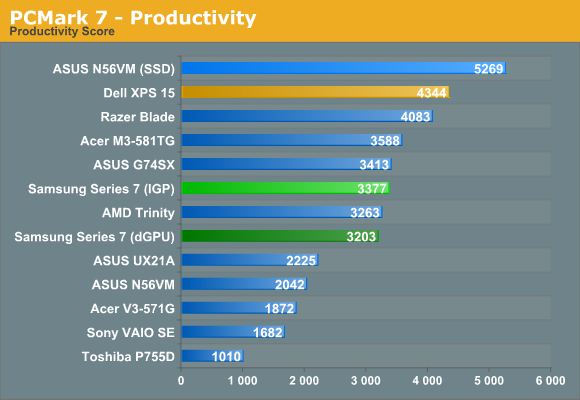
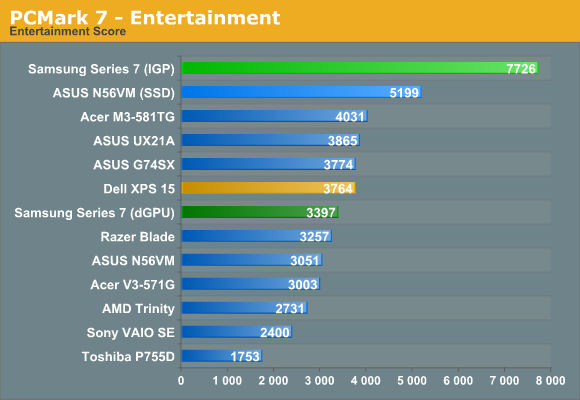
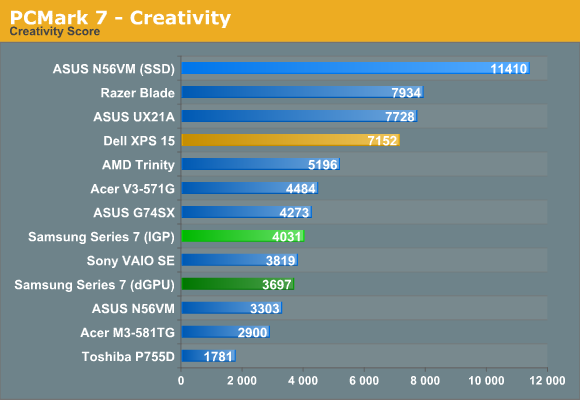
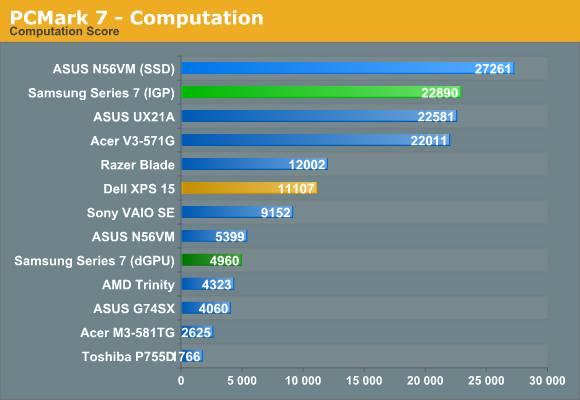
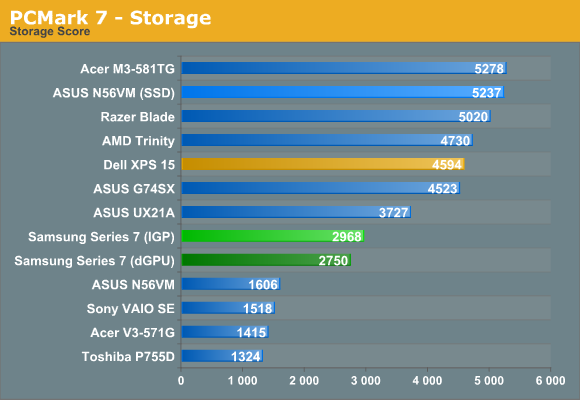
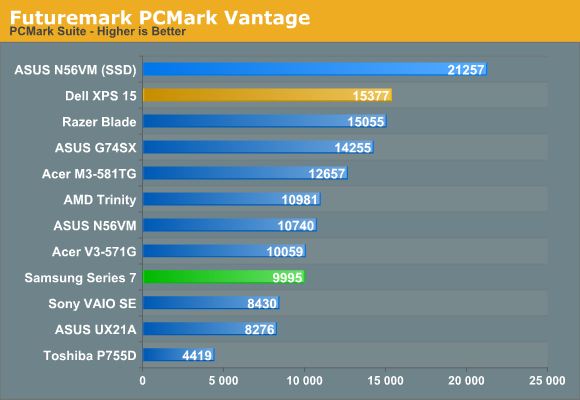
The overall PCMark 7 scores looks pretty competitive, coming in just below the similarly equipped Dell XPS 15. However, that’s not the whole story, and when we drill down into the individual scores we get a better idea of what’s going on. For whatever reason (possibly drivers), Samsung’s Series 7 notebook scores exceptionally well in the Entertainment test, and it also generates the expected ~22K score in the Computation suite. Both suites heavily leverage Intel’s Quick Sync technology, but the XPS 15 results are rather low by comparison while other scores are higher (thanks to a faster storage setup). Acer’s V3 is in a different dilemma, with no solid state storage, and that really puts the brakes on in PCMark 7. It’s a decent start for Samsung, but the Storage subtest shows what we mentioned earlier with a score much lower than any of the other SSD/SSD caching solutions.
PCMark Vantage in this case is potentially more useful, as it doesn’t skew so badly with Quick Sync (and Intel IGP drivers). Here the Samsung actually just matches the Acer V3, which is pretty telling considering they have similar hardware other than the GPU and SSD cache. For that matter, Acer’s use of a 5400RPM Toshiba drive makes it one of the slowest in terms of storage. In short, while some tests show the Samsung Series 7 storage coming in much faster than a plain old HDD, in practice we felt it was often only marginally better than an HDD.
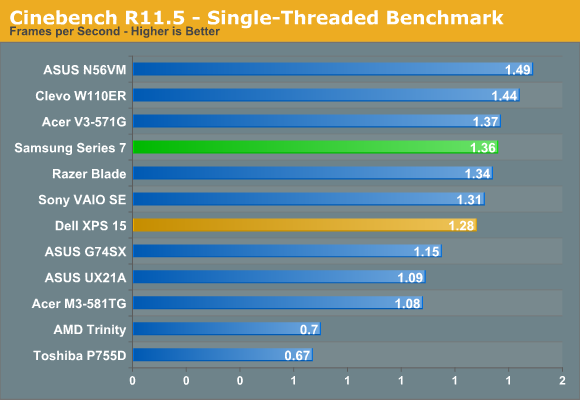
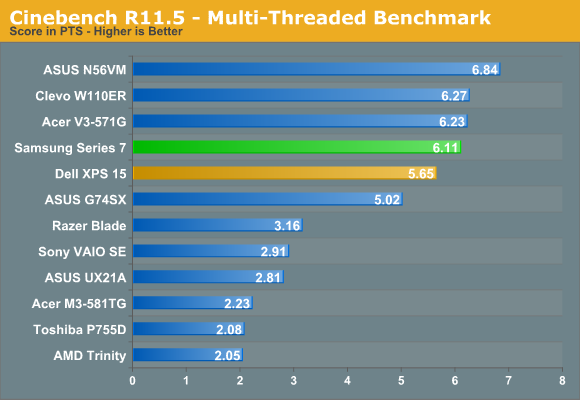
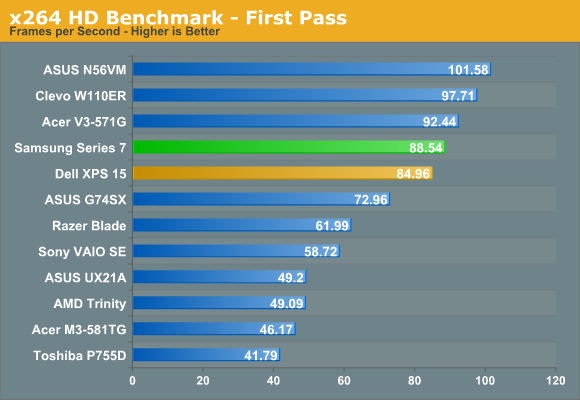
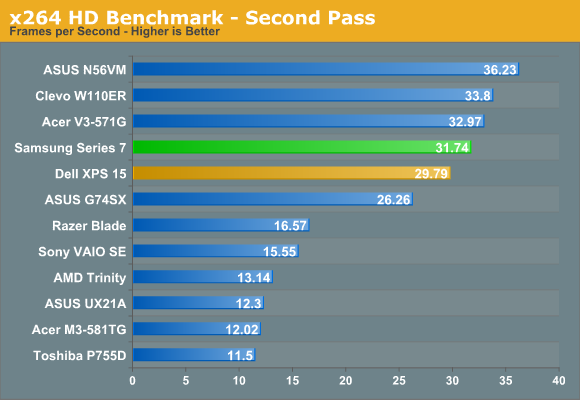
Our CPU-centric tests are interesting as well, with the Samsung scoring about where expected but still a bit slow. Acer uses an i7-3610QM processor with the same clock speed range as the i7-3615QM, and yet it ends up faster in all of the CPU tests. It’s not that Samsung is throttling; it’s just not quite as optimized and can’t hit max Turbo Boost as often as some of the competing laptops. If you need every ounce of CPU performance, there are obviously faster laptops and notebooks out there, but for most consumers any of the quad-core Ivy Bridge processors will be more than sufficient (and perhaps even overkill).
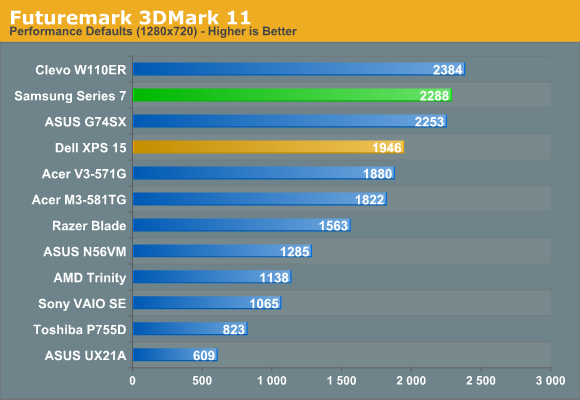
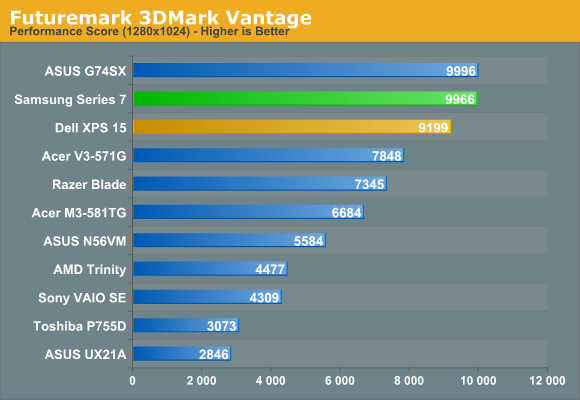
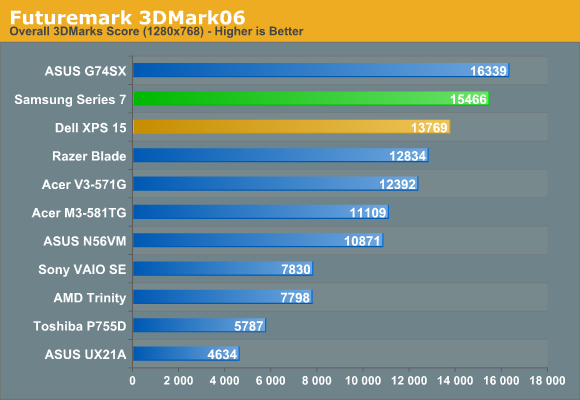
We wrap up our initial application performance with a quick look at 3DMark, and here the GT 650M is able to put in a showing. Clevo uses the same GPU in their W110ER, only with DDR3 memory. 3DMark11 doesn’t appear to mind the lack of bandwidth, but we’ll see in a moment how that carries over to actual gaming results—at lower detail settings/resolutions it shouldn’t hurt, but in particular 1080p gaming will benefit from the presence of GDDR5. Also as expected, the GT 650M GDDR5 is consistently faster than the GT 640M GDDR5 in the XPS 15.










50 Comments
View All Comments
lbell - Friday, August 17, 2012 - link
It seems to be a PERFECT laptop if the user replaces the HDD with a SSD, plugs a gaming mouse and uses it in ACed room.nerd1 - Friday, August 17, 2012 - link
I think the biggest drawback of this laptop is the lack of secondary HDD bay. Many laptops now provide mSATA slot where user can easily put 128GB boot drive (and they cost as low as $100 nowadays too) while keeping ~1TB data drive. With a single 2.5" bay such setup is not possible. Small SSD cache is just a gimmick and generally not comparable to true SSDs. And they should provide slower 35W CPU option as well - which should help overheating a bit.Anyway I think this laptop is actually one of the best 17" laptops out there for general public, and one good replacement for 17" MBP which is now discontinued.
.Hg. - Friday, August 17, 2012 - link
Hi Jarred,thanks a lot for your review. Since we cannot trust specification sheets anymore when we choose a laptop, the work of good reviewers is essential.
If manufactures decide that performances don't really matter, we will gladly spend more on the monitor and less on the CPU/GPU, or we will buy tablets instead of notebooks.
I hope you'll improve your testing methodology about the impact of the cooling system on the performances, because if when a laptop "falis" the stress test, it "doesn't really matter", then the stress test doesn't really matter itself.
I'd like to suggest testing an heavy CPU load with the GPU turned on but idling. This is the Adobe Premiere Video export scenario or generic cpu load using an external monitor. My XPS15 throttled badly with the A04 bios after 2 min during this test, because the heat from the CPU triggered the GPU temperature threshold. Manufacturers should find a clever way to balance TDP than temperature thresholds.
Also, please keep in mind that a CPU at 1.2GHz has a lot of impact on the gaming experience, much more than average fps shows, and that a GPU continuously throttling between 800 and 200 mhz has higher average fps than a GPU fixed a 400 Mhz, but it gives a lot worse gaming experience.
nerd1 - Friday, August 17, 2012 - link
No, CPU power rarely affects gaming experience, as most of the games are now developed multi-platform and ivy bridge@1.2Ghz is still WAY better than any console out there. On the other hand, GPU power directly affects framerate..Hg. - Friday, August 17, 2012 - link
It does, I experienced an awful control lag with Assassin Creed II and Prince of Persia.Games that are not properly multi-threaded will suffer the low frequency. Ivy Bridge can't do miracles.
And games that are properly multi-thread will show much greater power absorption even at low frequency because of the higher load, and if the cooling system is not good, the system will try to reduce the GPU frequency.
nerd1 - Friday, August 17, 2012 - link
No, I don't think such an ancient game can load CPU to maximum. It ran fine with core 2 duo processor, which has much lower power-per-clock than new ivy bridge processor. The only cpu-consuming task I can imaging for computer game is heavy physics simulation, which is done with GPU now.JarredWalton - Friday, August 17, 2012 - link
It's not that the stress test doesn't matter at all, but I would say it's not a make or break situation for most people. Obviously (I would think, but maybe not?), a laptop that runs cooler right now should hold up better over the long term than a laptop that is hitting thermal limits right from the start. The XPS 15 is horrible when it comes to throttling; the Samsung is only throttling under extreme loads -- in a rather warm 80-85F environment, I might add (curse my lack of AC).If you happen to live in a place like AZ and take your laptop outside where it's 105F, and then you put a 100% load on the GPU and CPU, I'm not sure any laptop would cope with that sort of testing without throttling. It's the way things are supposed to work. The real question -- and it's a question that's difficult to answer -- is how much a laptop can handle before it starts to throttle. That's what the stress test is there to help evaluate.
If you need a notebook that can run both CPU and GPU at 100% simultaneously in a 70F AC regulated environment, that's fine. In that case, the Series 7 falls short, but it's still a lot closer than the XPS 15. If you're a typical user that plays games, on the other hand, then that's the metric you should look at, keeping in mind that certain titles will likely stress the CPU/GPU more than others.
nerd1 - Friday, August 17, 2012 - link
I think the only laptop that can withstand full load for a long time is thick gaming laptops.seapeople - Friday, August 17, 2012 - link
Jared has it right here, the only way to really fail a stress test is for the computer to overheat and brick itself. Everything is a gray area.If the Samsung did so poorly that it throttled instantly to ultra poor performance levels the moment a game was started *cough Dell cough* then it would deserve a thrashing, but it handled high performance gaming with only limited throttling issues, so therefore deserves better than a unilateral no vote.
Besides, if the computer throttles during gaming too much to suit you, then you can reduce the settings/CPU speed to suit. You would lose performance, sure, but we're still talking about something that would destroy ultrabooks or entry level graphics cards.
gandralf - Friday, August 17, 2012 - link
My company has bough four samsungs (expensive, supposed high end series 9 ultrabook). Three of them had problems. Terrible built, mega fragile.